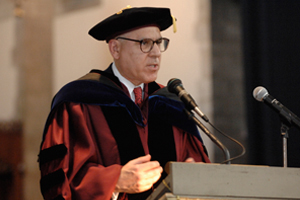Compound interest
Law School creates full-tuition scholarship program with $10 million gift from University Trustee David M. Rubenstein, JD’73.
By Jason Kelly
Photography courtesy University of Chicago Law School

Personal experience made a scholarship program important to Rubenstein.
David M. Rubenstein, JD’73, graduated from the Law School with no debt, which is why he felt he owed so much. In September Rubenstein made a $10 million gift—the Law School’s largest ever from an individual—which will fund 60 full-tuition scholarships like the one he received. He called it a “modest repayment” for his good fortune.
Cofounder and managing director of the private-equity firm the Carlyle Group, Rubenstein has pledged to donate half of his $2.5 billion—personal worth that makes him No. 123 on the Forbes list of wealthiest Americans. “I don’t have the wealth to make transformation gifts,” he told the Washington Post in May, “but around the margins I can help.”
Recipients of Rubenstein’s largesse—which include Duke University’s public-policy institute, Washington’s John F. Kennedy Center for the Performing Arts, and the Library of Congress—nevertheless describe his contributions in transformational terms. “This is a game-changer,” says Law School Dean Michael Schill. Because of the Law School’s comparatively smaller endowment, he says, “we have lagged some of our peers in the scholarship aid we can offer.”
Receiving a full-tuition scholarship, Rubenstein tells the Law School Record, was the reason he chose Chicago. The funding allowed the magna cum laude Duke graduate to tell his father, a Baltimore postal clerk who never made more than $10,000 a year, that he would not need financial assistance. “That meant a lot to me,” Rubenstein says.
After graduating, the scholarship afforded him the freedom to leave private practice and become chief counsel to the U.S. Senate Judiciary Subcommittee on Constitutional Amendments. Two years later, at age 27, Rubenstein was named the Carter administration’s deputy assistant to the president for domestic policy.
The White House job “didn’t pay badly,” he says, but the steps toward it might have been impractical had he been paying student loans. “I probably couldn’t have pursued that opportunity if I had been burdened with debt.”
Relieving that burden for future students was the driving force for his Law School contribution—the first he made after announcing he’d give away half his wealth. From 2011 to 2013, the David M. Rubenstein Scholars Program will fund all three years of law school for 20 entering students, about ten percent of each class.
Like Rubenstein, Schill relates to this gift on a personal level. Neither of his parents went to college, and scholarships helped him attend Princeton as an undergraduate and Yale Law School. “Generous assistance from Princeton,” Schill says, “actually made it cheaper to go there than the State University of New York.”
Rubenstein’s contribution also revives a Law School tradition. In 1959 the Floyd Russell Mechem Prize Scholarships became the first full-tuition, merit-based grants offered by a major law school. For more than 30 years, the scholarships went to students such as U.S. Court of Appeals judges Danny J. Boggs, JD’68, and Douglas Ginsburg, JD’73; Ohio attorney general Richard Cordray, JD’86; and Wachtell Lipton partner Andrew Nussbaum, JD’91.
It might take years to compile a similar list of Rubenstein Scholars, but he will be assessing the effects of his investment from the start. “Let’s see the results right away,” Rubenstein says. “If it works, you can expand it or extend it. If it doesn’t, try something else. If the Law School gets the right bang for these bucks in a short time frame, it could make a very big difference very quickly.”
Return to top
